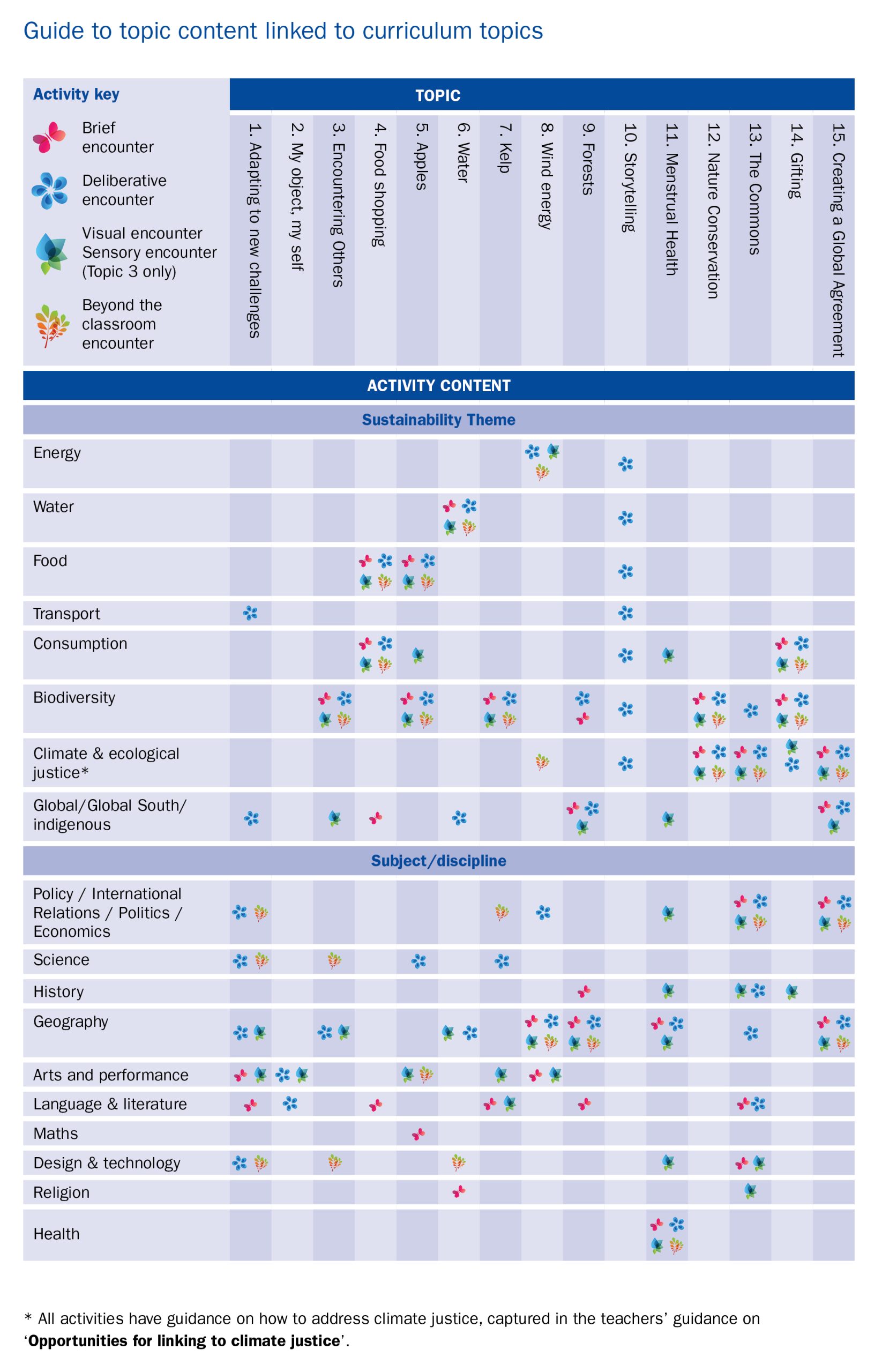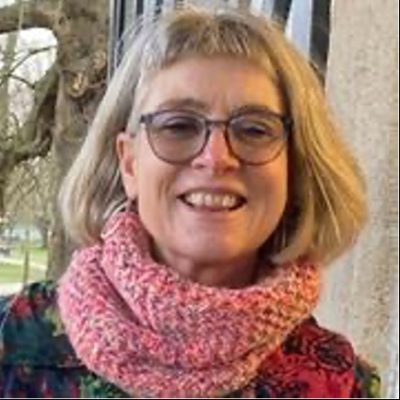1 Introduction to the education pack
Perpetua Kirby and Rebecca Webb
What is meant by creating with uncertainty?
We all live with uncertainties. There are no clear answers, and yet nonetheless we must arrive at our own positions about what to think and what to do. This includes how we might live our lives differently and more sustainably, even if sustainability itself throws up many uncertainties about what might happen, what to do and how best to live our lives in ways that mitigate the damage humans are causing to the planet.
This set of resources is designed to support students to attend closely, dig deeply and engage with the complexities of climate change and biodiversity loss in their everyday lives. It consists of fifteen on-the-ground sustainability topics, each offering different activities that can be used to enrich teaching across the curriculum. They engage students philosophically and practically to work towards a more sustainable world.
But what is key is that this pack offers opportunities to be creative with uncertainty, so that students and their teachers can draw on their own and curricular knowledge, to see what new things they might discover. The invitation is to be uncertain together, where neither the educator nor the student does not (and cannot) know the answer in advance. After all there will not be ‘one right answer’!
By encouraging students to use things they already know—whether learned at school or elsewhere—they find out something not yet known. This is why the activities can work (and be easily adapted) for students of any age, aptitude and level, including those in early years, primary, secondary and special schools. Some have even been co-created and used with our own higher education students.
Encountering complex sustainability issues alongside a supportive and attentive teacher offers students the opportunity to stick with the challenge of working through something to consider where they stand on an issue, which might be difficult to do but also deeply satisfying, as well as charting a possible way forward.
Students are supported to be creative with uncertainty to:
- Explore and deliberate diverse knowledge and perspectives.
- Experiment with different ways of knowing, including the intuitive, experiential, multisensory, and emotional, as well as the rational.
- Tolerate the difficulty of ‘not knowing’ and ‘getting lost’ and to explore alternative possible pathways.
- Be attentive to the world and to encountering it anew, so as to interrupt ‘business as usual’ ways.
- Identify how to live with responsibility and justice for others – including other species – as well as oneself, on a planet with limited resources.
Encounters and opportunities: Student target group and activity guidance
The pack is for teachers and other educators working in any educational context whether formal or informal. It is appropriate for all students of any level from early years through to secondary school age (or beyond).
The pack is organised around 10 topics: the sustainability and subject areas covered by each topic are presented in the table below.
The topics include four activities, as follows:
- Brief encounter: this is designed to be short activity that can slot into a lesson related to the topic.
- Deliberative encounter: this is a longer activity and involves students engaging with different perspectives and experiences in a more sustained way.
- Visual or sensory encounter: these activities require students to attend to visual stimuli or engage in other sensory sources.
- Beyond the classroom encounter: these activities are designed with the intention that students will do them at home possibly with the support and engagement of their family and friends. The exception is Topic 2. My Object, My Self, in which this last activity is a collaborative class exhibition for families/others to view. All other Beyond the classroom encounter activities can also be adapted for use in the classroom.
The exception to the pattern set out above is the final storytelling topic, which includes an activity, Funcertainty. This is designed to work best either with a smaller group (e.g. an eco-council) or when there is more time to engage with larger group (e.g. during an enrichment week or holiday club).
For every activity within each topic, teacher guidance is provided. This focuses on the following:
- Opportunities for embracing uncertainty: Guidance is offered on how the specific activity fosters an engagement with ideas of uncertainty explored in this introduction.
- Opportunities for all students: Many of the activities can be adapted to be used with all students, regardless of age and level. Guidance is given on how this might be done but respects teachers’ knowledge of what works with their own group. The language therefore avoids ‘age’ or ‘ability’: the assumption is the inclusion of all students and is less concerned with ‘right’ answers. What is important is the ongoing engagement, in whatever form is applicable for each student in their diverse contexts.
- Opportunities for creative thinking: The activities allow for a creative focus that enables students to surface and acknowledge the many ways that they might respond to the subject-matter, that they might not otherwise have been so aware. Guidance is offered on how to extend this for each activity.
- Opportunities for linking to climate justice: This includes how to extend the activities to include a focus on social justice and diversity, and multilingual and multicultural matters.
Education resource development: co-creating with uncertainty
The development of the activities was led by academics in the Department of Education, University of Sussex, including experienced schoolteachers, together with a team of colleagues with sustainability expertise from across the university and partner organisations. It includes input from those working in the following disciplines: Life Sciences, Media, Arts, Humanities and Global Studies.
The pack offers students the opportunity to engage with current academic research, through the inclusion of links to films of their work and other resources.
Most of the activities have been trialled with students, but others are adaptions of activities that have been used; none have been trialled with students of all ages and levels. We acknowledge our own uncertainty about how the different activities will work with diverse groups of students, across multiple contexts. We welcome feedback from teachers and students about how the activities have gone and any adaptations made to your specific context. Please do email the team to let us know.
The film Creating with Uncertainty – TRANSFORM iN EDUCATION highlights examples of practice with students from primary, secondary and special schools in the UK.
[https://www.youtube.com/watch?v=AbTKw5WA38o]




